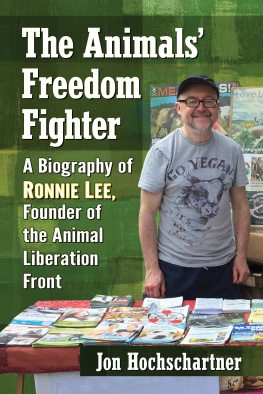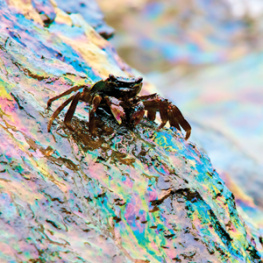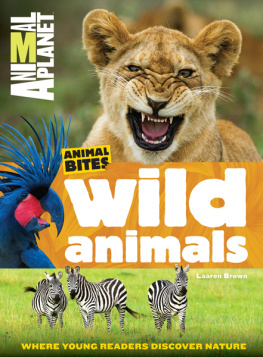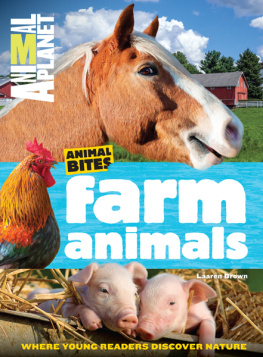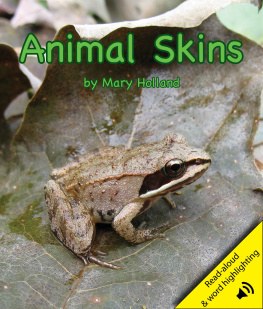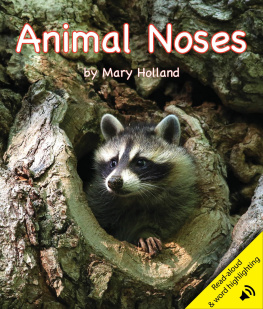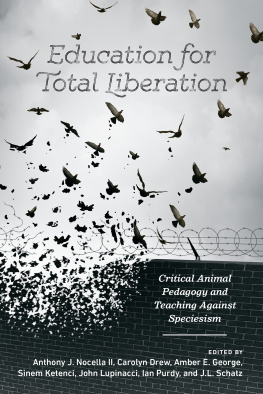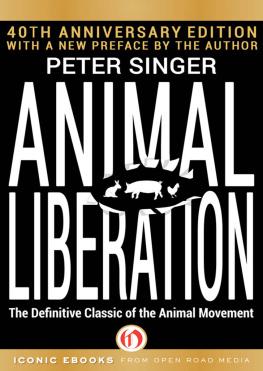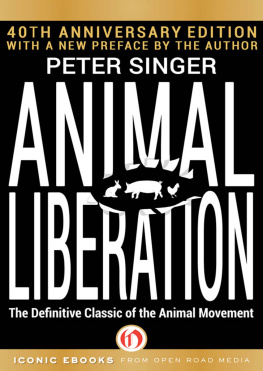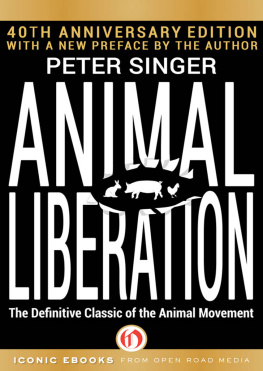
The Animals Freedom Fighter
A Biography of Ronnie Lee, Founder of the Animal Liberation Front
JON HOCHSCHARTNER

McFarland & Company, Inc., Publishers
Jefferson, North Carolina
LIBRARY OF CONGRESS CATALOGUING DATA ARE AVAILABLE
BRITISH LIBRARY CATALOGUING DATA ARE AVAILABLE
e-ISBN: 978-1-4766-2746-5
2017 Jon Hochschartner. All rights reserved
No part of this book may be reproduced or transmitted in any form or by any means, electronic or mechanical, including photocopying or recording, or by any information storage and retrieval system, without permission in writing from the publisher.
Front cover: Ronnie with Wyre Forest Vegans & Veggies stall at an animal sanctuary fundraising event in Stourbridge, United Kingdom, May 2016 (courtesy Ronnie Lee)
McFarland & Company, Inc., Publishers
Box 611, Jefferson, North Carolina 28640
www.mcfarlandpub.com
To my beloved wife Amanda,
without whom nothing would be possible,
our companion animals, Max and Teddy,
who bring so much joy to our lives,
my parents and sister
Selden, Hock, and Lucy
who have always been there for me,
and my mother-in-law, Judy,
for welcoming me to the family
Acknowledgments
Id like to thank Ronnie Lee. A first-time biographer couldnt ask for a better subject. Ronnie was always cheerful and prepared for our weekly interviews by conducting significant amounts of his own research. In many respects, he is an uncredited co-author of this book. Id like to thank Josh Harper, formerly of the SHAC 7, who helped proofread the manuscript for historical accuracy.
Finally, I would like to thank the following people, who donated to the crowdfunding campaign that enabled me to write this biography: Hayley Dunk, Doug Hine, Katy Bones Lowe, Jacky Owen, Paul Crouch, Melissa Mallen, Joolz Hatton, Ted Grant, Skye Hollywood, Colin Avolve, Yolanda Raymond, Sharon Kirby, Barbara DeGrande, Natalia Prez, Andrew Lee Wright Barnes, Amanda Holtey, Kathy Goss, Michael Beasley, Neil W., Glenys Isaacs, David Bastien, Fiona D., Steven Peters, Angela Lynch, Brian Foster, Steve P., Animal Concern, Dipen Ramesh Patel, Michelle Walsh, Faye Thatcher, Angela Wear Your Voice Tubb, Marc and Sarah Nelson, Veda Stram, Jocelyn and Lisa Fragniere, INVSOC Invercargill Vegan Society, Craig Hollingsworth, Alwynne Cartmell, New Zealand Anti-Vivisection Society, Rob Sheppard, Mark Muzzy Muschamp, David Hochschartner, Polly Holt, David and Bella, Trish Smith, Robin Howard, Angie Hamp, Bobby Balfour, Andrew Willgoss, Jan Glover, Emmy Amers, Jake Hobbs, Sue Baumgardt (Dickens), Liz Layton, Dan Doherty, Audrey Garcia, Nigel Davies, Eric Moreau, Genevieve Cottraux, Mary R. Crumptom, Bernie Wright, Pat Wainwright, Angie Wright, and Wendy Alf Fletcher and many others.
Preface
This project began in late 2015. Since college, Id been interested in animal rightsand, more recently, animal-rights history. I was surprised and disappointed by the dearth of biographies and memoirs of animal-rights activists. So I set out to write one.
Choosing Ronnie Lee as a biographical subject was a no-brainer. These dayswhile Im awed by the courage of Animal Liberation Front activists and deeply sympathetic to the despair that drives themI believe only a mass movement can free animals. But, as a younger man, I was a great admirer of this underground organization. To be able to speak with Ronnie would be a dream. Plus, I knew that my own development, from an advocate of individualist attacks to one of electoral engagement, in some ways mirrored Ronnies own.
Thankfully, Ronnie agreed to cooperate in the writing of his biography. With the help of many generous backers on Kickstarter, we raised the funds that allowed me to take on the project. Every week, typically on Sundays, I would interview Ronnie over Skype. I estimate we recorded about 60 hours of conversation. Over this period, I experienced personal highs and lows. My fiance Amanda and I set a date to get married, while my cat Max suffered an inexplicable injury, requiring the tip of his tail be amputated. All this and more made it into my discussions with Ronnie, whom I came to consider a friend. But the interviews did more than this for me. They reaffirmed my view of Ronnie as a heroic figure.
For some time, Ive been a reader of Louis Proyects blog, The Unrepentant Marxist, which displays two quotes prominently. The first is from Max Horkheimer: A revolutionary career does not lead to banquets and honorary titles, interesting research and professorial wages. It leads to misery, disgrace, ingratitude, prison and a voyage into the unknown, illuminated by only an almost superhuman belief. The second is from I.F. Stone, and begins: The only kinds of fights worth fighting are those you are going to lose, because somebody has to fight them and lose and lose and lose until someday, somebody who believes as you do wins.
Ronnie has been this kind of fighter on behalf of animals. I hope you enjoying reading his story.
1
Family History and Early Years
Ronald Anthony Denis Leefounder of the Animal Liberation Front (ALF), who would serve three prison sentences for his activismwas born in Gloucester, England, on February 17, 1951. He is best known and will be hereafter be referred to as Ronnie.
Ronnies ideas and example, whatever one might think of them, have been undeniably influential. The leaderless-resistance model, as used in defense of animals, has spread across the globe. ALF is active in over 40 countries, according to the Palgrave Dictionary of Public Order Policing,Protest and Political Violence. In this writers own nation, the United States of America, the Federal Bureau of Investigation ranked ALF and groups like it as the foremost domestic-terrorism threat facing the country, as recently as 2005.
And yet, Ronnies origins were fairly inauspicious.
Margaret Tierney, Ronnies mother, was born on a small farm in Newtownhamilton, Northern Ireland, on January 7, 1920the same year Frank Aiken led 200 men from the Irish Republican Army in an attack on the Royal Irish Constabulary barracks in that village. Her parents were Mary and Patrick Tierney. Margaret was the second eldest of seven children and lived with her family on what was primarily a dairy farm. They did have pigs and chickens there as well, Ronnie said, adding they also grew some vegetables. As Catholics in Northern Ireland, the Tierneys were part of a religious minority.
Margaret left school at 14, helping at home, and traveled to England three years later with an older friend of the family, who was marrying a doctor in Oakworth, West Yorkshire. Basically, they employed my mum to help in the doctors surgery with small tasks, such as bandaging patients, Ronnie said.
When the Second World War began, Margaret went back home, believing it to be safer than Oakworth. Where she was workingalthough it was out in the countryit wasnt too far from some big industrial cities in the north of England, Ronnie said. They thought if there were bombings, she might be effected.
But she was called up for military service and had to return to England. After working in a factory testing electrical equipment, Margaret began military training in Pirbright, Surrey. One of the things a lot of women did in those days was working in the [Womens] Land Army, which was growing crops, because the men were away at war, Ronnie said, before adding his mother didnt want to do that, having grown up on a farm. Instead, she volunteered for the Auxiliary Territorial Service, the womens branch of the British army. They didnt serve as troops, Ronnie said, adding much of the ATS work was clerical. She processed the soldiers applications for home leave. That was her main job.
Next page
